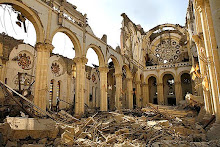
"Are you gonna feed my kids?"
This is the reply of a woman recently invited to join the "occupiers" who we see camped out in major cities all over our country in exercise of free speech to demand more money. We think.
There seems to be more confusion about these roughly organized groups than anything else. In their joblessness, inactivity and helplessness these occupiers are more like lost and scattered sheep, without a shepherd, unable to promise anything to anyone else let alone do anything for themselves.
Whether it is a job, money, food or shelter, we humans seeks these things as a good for today and, perhaps even more so, as a promise of life for tomorrow.
"Thus says the Lord GOD: I myself will look after and tend my sheep."
God makes a promise in the first reading that He himself must be the one to shepherd humanity: "shepherding them rightly" with disinterest, justly, that is with love.
How will God do this? Wherever humanity is lost, strayed, injured or sick He Himself must be the one to attend to their needs if they are to have life today and hope for tomorrow.
In the Gospel reading the Divine Word interprets Ezekiel rightly, the prophecy being fulfilled in Jesus Christ. How, you ask, will God Himself shepherd the sheep? How can we hope to be found, to have our wrongs righted, be healed, made whole? The answer to this question is found in you and in me.
Through the grace of our Baptism we have been incorporated into the "royal family" of God. We have inherited heaven and with it a share in the work of Christ which continues now in the world.
God shepherds His people as Christ acts in each and every one of us:
"I was hungry and you gave me food,
I was thirsty and you gave me drink,
a stranger and you welcomed me,
naked and you clothed me,
ill and you cared for me,
in prison and you visited me.'"
Jesus Christ is the King of the Universe. His kingdom becomes a tangible experience for all mankind when His Body, the Church on earth, fulfills His mandate to feed, give drink to, embrace, clothe, care for and visit any brother or sister in need.
The Kingdom remains closed to those who cannot live in Faith, see with the eyes of Faith, know God through Faith.
"The kingdom of God [is] righteousness and peace and joy in the Holy Spirit." The end-time in which we live is the age of the outpouring of the Spirit. Ever since Pentecost, a decisive battle has been joined between "the flesh" and the Spirit.
- Only a pure soul can boldly say: "Thy kingdom come." One who has heard Paul say, "Let not sin therefore reign in your mortal bodies," and has purified himself in action, thought and word will say to God: "Thy kingdom come!"(CCC 2819)
The power of God's Kingdom is found in the grace of seeing Christ in every human person and responding to the vision of faith. The king identifies Himself with those who seem in a superficial point of view to be the most distant from a kingly court, a royal palace: with the poorest of the poor.
"The kingdom belongs
to the poor and lowly, which means those who have accepted it with humble hearts. Jesus is sent to 'preach good news to the poor'; he declares them blessed, for "theirs is the kingdom of heaven." To them - the "little ones" the Father is pleased to reveal what remains hidden from the wise and the learned. Jesus shares the life of the poor, from the cradle to the cross; he experiences hunger, thirst and privation. Jesus identifies himself with the poor of every kind and makes active love toward them the condition for entering his kingdom. (CCC 544)
Only God can promise food, clothing and shelter. Forever. These are the food of His Eucharist, the clothing of grace and the shelter of the place in heaven He has prepared for us. "Occupy" the Kingdom by receiving the Eucharist as a member of His Body the Church and live His life now through service of others.
If we want to enter into the kingdom prepared for us from the foundation of the world, into the eternal joy of the Lord in heaven, we know what we must do. The King Himself has told us:
"Amen, I say to you, whatever you did
for one of the least brothers of mine, you did for me.'"
((((..))))
 ... born under the law, to ransom those under the law, so that we might receive adoption as sons.
... born under the law, to ransom those under the law, so that we might receive adoption as sons.



























